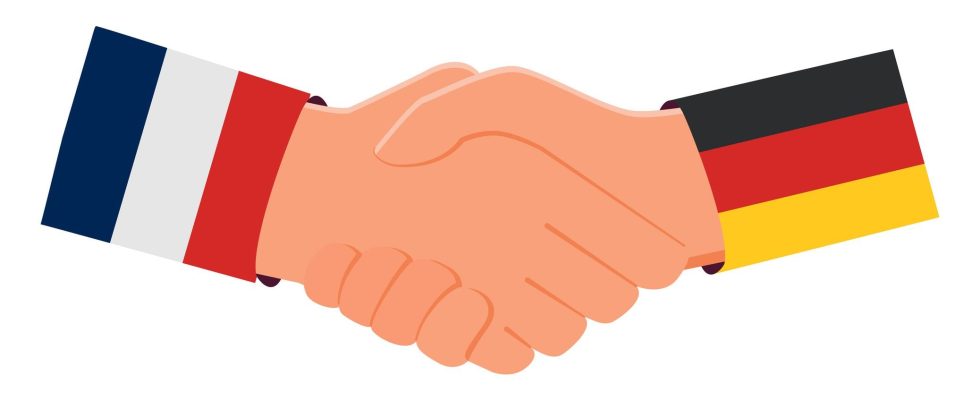Buying a business in Germany, an obstacle course? It is not the director of mergers and acquisitions of the Breton agricultural cooperative group Eureden who will say the opposite. “I worked in three French mid-sized companies, where I always did international buyouts. And we always struggled in Germany,” admits Cédric Lombard with a burst of laughter. Until last September, when his current employer – 8,500 employees and 3.9 billion euros in turnover – acquired Ovofit.
Nestled in the heart of the Bavarian countryside, an hour’s drive from Munich, the family SME with 150 employees has been producing preparations from eggs that it poaches, fries and transforms into omelettes or pancakes for half a century. Foods that it markets well beyond its borders, as German industry knows how to do so well. “We knew Margit [Kurz-Rothmaier, la dirigeante actuelle de la société] for around ten years, through our meetings at trade shows. In our external growth strategy, we have targeted Germany for its geographical proximity and made Ovofit our priority target. But I remain surprised that they were so attracted by the French”, Cédric Lombard is still surprised, seven months after the announcement of the takeover.
The acquisitions carried out by French companies in Germany are, however, far from being isolated operations. For Olivier Lorang, one of the directors of the British consulting firm PwC in France, they have rarely been so numerous: so much so that he calls 2023 a “record year”. “All types of deals combined, whether classic acquisitions, private equity or LBO [des investissements dans des sociétés non cotées et des rachats d’entreprises via de la dette], 130 operations were carried out by French players in Germany in 2023, compared to 98 the previous year. The level remains far from that of the country’s leading investors, the United States and the United Kingdom, which carry out several hundred operations each year. But it has been unpublished for at least ten years. This reflects the attractiveness of Germany, despite an unfavorable economic context,” considers the expert.
The thorny issue of succession
How to explain such a jump? The successive shocks of recent years have plunged into turmoil some industrialists of the much envied Middle stand, creating opportunities for buyers. Shaken by the Covid which grounded the global fleet of aircraft and stopped the production of new aircraft, the Rhineland specialist in cabin interiors EIS Aircraft was taken back to court by a German financial player. Two years later, this same investor sold it to the Norman plastics manufacturer Demgy. An operation which its manager, Pierre-Jean Leduc, welcomes. “This recovery opportunity converges with our strategy. We have every interest in growing our activity in aeronautics: manufacturers’ order books are full for the next ten years. The operation also allows us to rise to the top as a tier 1 supplier, and not 2 as has historically been the case for Demgy”, relates the business manager.
According to observers, the jump in operations carried out with German companies is less due to economic upheavals than to succession issues. Published in January, a study by the Munich Economic Research Institute Ifo concludes that 43% of German family businesses will face in the next three years the thorny question of the transfer of the company itself, or its shares. … Without necessarily having a solution. Based on the same data, another survey estimates that 42% of the structures surveyed have not yet identified a successor in the founding family. A real concern for the country, as SMEs weigh heavily in its economy. “Their weight is very significant. There are more than 400,000 SMEs in Germany: their number is twice as high as in Italy and three times as many as in France. At the same time, many entrepreneurs are today between 55 and 70 years, which accelerates succession issues”, confirms from Frankfurt Markus Geiger, head of private debt for the Franco-German financial group Oddo BHF.
The manufacturer Icape knows something about this. Caught in an acquisition fever, this printed circuit trader from Hauts-de-Seine established its place on the German market by acquiring not one, but two competitors last year: HLT and Princitec. “Most of the companies we target were founded in the 1990s, when the relocation of printed circuit production began to Asia. Their founders often worked in factories and moved into trading. acquisitions that we carried out, no manager was able to identify a buyer, everyone preferred to partner with us to ensure business continuity”, testify the director of strategy, Shora Rokni, and the new general director of. Icape, Yann Duigou.
The scenario is the same for the Bavarian SME Ovofit, which fell into the arms of Eureden. “Many players in the automotive sector are for sale due to a market slowdown in Germany, and because the third generation does not want to take on the challenge that parents and grandparents led” , believes Pierre-Jean Leduc, who himself took over Demgy in 2004 without coming from the family of the former owners. The birthplace of BMW, which has remained one of the great strongholds of cars made in Germany, Bavaria is alerting to this issue around the transfer of SMEs. Two years ago, the number 2 of the regional government, Hubert Aiwanger, judged that “the success of generational change [était] of fundamental importance for maintaining the economic backbone of the Land. Perhaps it will be done with the help of French companies.
.
